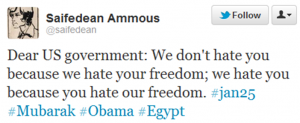Okay, as eager as I am to get back to pop culture, last week’s Egypt blog was just a mess. So, I’m going to do one more week of politics and clarify what I was trying to say last time. But soon, shiny happy “OMG TV representation is so crazy!”
Let’s rewind to last week and think about that tweet again and what it tells us about Egypt: 
By itself, it gave me an “Aha!” moment, but what I figured out thanks to Wendy Brown’s Regulating Aversion: Tolerance in the Age of Identity and Empire was what it really meant.
So, we’ve got this ideology that says that the West is the beacon and arbiter of all things civilized. Only “we” are democratic, free, tolerant, etc., and “they” are inherently (constitutive-other-ly, in fact) none of those things.
Under this model, when non-Western countries refuse to acknowledge Western superiority and beg us to lead them into the light, they’re hopelessly backward. Nevermind that they may have different sets of values—the community over the individual, say—and don’t want to do things our way.
Nevermind, in fact, that the idea that things like religion are private is totally grounded in the Protestant idea that you have a personal, reasoned relationship with God and that it isn’t actually a model that’s portable to other types of religion, let alone other sorts of ways people differ from each other like race or gender.
No, no. None of that. “We” are right and “they” are wrong, end of story. “We” are superior in the way we tolerate things, which they don’t do. “They” are so intolerant that we refuse to tolerate their intolerance. “They” have to change and be more like us. This is not us being culturally imperialist, but a universal value of humanity that they refuse to recognize.
That, then, is what “we hate you because you hate our freedom” references—the insistence that non-Western cultures be exactly like Western ones or else be barbaric is bound to piss off those people getting labeled barbarians.
It’s only under a logic like this that the Washington Post can tell us that the “Arab world” has a “freedom deficit” and “political underdevelopment”—because there’s a norm they aren’t living up to. It’s a Western norm, but it’s seen as a universal norm.
There is, as I pointed out, a gesture away from the first part of the logic—“they” are inherently barbarous and un-free-able—with the WaPo arguing that the protests in Egypt, Tunisia, Jordan, Yemen, and elsewhere are “exploding, once and for all, the myth of Arab exceptionalism.”
But the second part of the logic still stands, where the West’s way of doing this is inherently superior, such that it amounts, as I suggested last week, to “Hey, those Arabs aren’t as irreparably backward as we always thought. They want to be like us after all!”
But this part is exactly what the protests in Egypt are rupturing, if we can see what they mean. The idea that “we” are the keeper of things like freedom and “they” aren’t allowed to be free or tolerant or internally diverse unless “we” bring it to them has to go out the window when there’s an uprising from within.
Not spurred by U.S. invasion, literal or figurative, but the people themselves in a non-Western place saying “We are SO done with this dictatorship thing.” The idea of resistant “savages” being forced or cajoled into freedom by a light-bringing West is looking a lot less reasonable these days.
That’s what I really meant to say. Tune in next time for The Peculiar Racialization of Rachel Berry.
